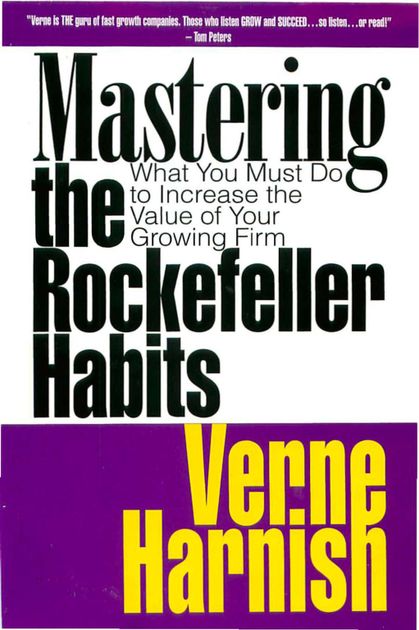“Routine sets you free.” – Verne Harnish
“Mastering the Rockefeller Habits” by Verne Harnish is a practical guide for entrepreneurs and business leaders to achieve sustainable growth and success by implementing disciplined habits and strategies inspired by John D. Rockefeller.
The book seeks to answer the question – what can we learn from Rockefeller and how can we incorporate his work habits?
Chapters with Quick Summaries:
- The Importance of Habits: Introduction to the concept of habits as the foundation of business success, inspired by Rockefeller’s principles.
- Setting Priorities: Emphasizes the importance of focusing on a few critical priorities to drive growth.
- Data and Metrics: Discusses the role of key performance indicators (KPIs) in monitoring progress and making informed decisions.
- Rhythm and Meeting Structures: Outlines the importance of establishing a regular meeting rhythm to maintain alignment and accountability.
- The One-Page Strategic Plan: Introduces a tool for simplifying and communicating the company’s strategic plan effectively.
- People and Culture: Explores strategies for building a strong team and nurturing a positive corporate culture.
- Execution: Provides insights into effective execution strategies to ensure that plans are put into action successfully.
- Cash Management: Highlights the significance of cash flow management in sustaining business operations and fueling growth.
10 Powerful Quotes from the Book:
- “Routine sets you free.”
- “What gets measured gets done.”
- “If you don’t have a plan, you become part of someone else’s plan.”
- “Meetings are the medium through which the business’s rhythm is established.”
- “Growth sucks cash.”
- “Priorities without data are just wishes.”
- “Culture eats strategy for breakfast.”
- “The bottleneck is always at the top of the bottle.”
- “Execution is the ultimate differentiator.”
- “Every breakthrough in performance is preceded by a bold move.”
Book Review:
“Mastering the Rockefeller Habits” is a must-read for any entrepreneur or business leader looking to scale their company and achieve long-term success. Verne Harnish has distilled the essence of John D. Rockefeller’s business practices into actionable habits that can be applied to any organization. The book’s strength lies in its practicality; it’s filled with templates, tools, and real-life examples that make the concepts easy to implement. The emphasis on disciplined execution, coupled with a strong focus on priorities, data, and rhythm, provides a clear roadmap for businesses to follow. While some may find the approach prescriptive, the results speak for themselves, with countless companies attributing their growth to the adoption of these habits. Overall, this book is an invaluable resource for anyone looking to master the art of scaling a business.
Interesting Lessons from the Book:
- The power of a daily huddle to keep teams aligned and focused.
- The importance of having a clear “Big Hairy Audacious Goal” (BHAG) to inspire and guide the organization.
- How to use a one-page strategic plan to communicate and execute your strategy effectively.
Who is the Author?
Verne Harnish is an entrepreneur, author, and speaker known for his expertise in business growth and scaling. He is the founder of the Entrepreneurs’ Organization (EO) and the CEO of Scaling Up, a company that provides executive education and coaching services. Harnish has been advising businesses for over three decades and is also the author of “Scaling Up: How a Few Companies Make It…and Why the Rest Don’t.”
Related Books for Further Learning:
- “Scaling Up” by Verne Harnish – A deeper dive into the strategies for scaling a business.
- “Good to Great” by Jim Collins – Explores the characteristics of companies that made the leap from good to great.
- “The E-Myth Revisited” by Michael E. Gerber – Discusses the myths surrounding starting a business and how to develop a successful business model.
- “Traction” by Gino Wickman – Introduces the Entrepreneurial Operating System (EOS) for running a successful business.
- “Built to Last” by Jim Collins and Jerry I. Porras – Examines the qualities of companies that have stood the
